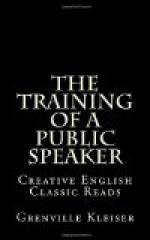But often when striving to be short, we become obscure, a fault equally to be avoided, therefore it is better that the narration should have a little too much, than that it should lack enough. What is redundant, disgusts; what is necessary is cut down with danger. I would not have this rule restricted to what is barely sufficient for pronouncing judgment on, because the narration may be concise, yet not, on that account, be without ornament. In such cases it would appear as coming from an illiterate person. Pleasure, indeed, has a secret charm; and the things which please seem less tedious. A pleasant and smooth road, tho it be longer, fatigues less than a rugged and disagreeable short cut. I am not so fond of conciseness as not to make room for brightening a narration with proper embellishments. If quite homely and curtailed on all sides, it will be not so much a narration as a poor huddling up of things together.
GETTING YOUR STATEMENTS ACCEPTED
The best way to make the narration probable is to first consult with ourselves on whatever is agreeable to nature, that nothing may be said contrary to it; next, to find causes and reasons for facts, not for all, but for those belonging to the question; and last, to have characters answerable to the alleged facts which we would have believed; as, if one were guilty of theft, we should represent him as a miser; of adultery, as addicted to impure lusts; of manslaughter, as hot and rash. The contrary takes place in defense, and the facts must agree with time, place, and the like.
Sometimes a cause may be prepared by a proposition, and afterward narrated. All circumstances are unfavorable to three sons who have conspired against their father’s life. They cast lots who shall strike the blow. He on whom the lot falls, enters his father’s bed-chamber at night, with a poniard, but has not courage to put the design into execution. The second and the third do the same. The father wakes. All confess their wicked purpose, and by virtue of a law made and provided for such case, they are to be disinherited. But should the father, who has already made a partition of his estate in their favor, plead their cause, he may proceed thus: “Children are accused of parricide, whose father is still alive, and they are sued in consequence of a law that is not properly applicable to their case. I need not here give an account of a transaction that is foreign to the point of law in question. But if you require a confession of my guilt, I have been a hard father to them, and rather too much occupied in hoarding up the income of my estate, which would have been better spent in necessaries for them.” Afterward he may say that they did not form this plan by themselves, that they were instigated to it by others who had more indulgent parents, that the result clearly showed they were not capable of so unnatural an action, that there was no necessity for binding themselves by oath if in reality they could have had such an inclination, nor of casting lots if each did not want to avoid the perpetration of such a crime. All these circumstances, such as they are, will be favorably received, softened in some measure by the short defense of the previous propositions.




